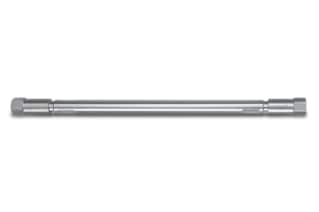
|
Chemistry |
C8 |
|
Separation Mode |
Reversed Phase |
|
Particle Substrate |
Silica |
|
pH Range Min |
2 pH |
|
pH Range Max |
8 pH |
|
Maximum Pressure |
6000 psi (415 Bar) |
|
Endcapped |
Yes |
|
Bonding Technology |
Shield RP8 |
|
Silanol Activity |
Low |
|
Particle Shape |
Spherical |
|
Particle Size |
3.5 µm |
|
Endfitting Type |
Waters |
|
Pore Size |
100 Å |
|
Format |
Column |
|
Surface Area |
335 |
|
System |
HPLC |
|
USP Classification |
L7 |
|
Inner Diameter |
4.6 mm |
|
Length |
75 mm |
|
Carbon Load |
15 % |
|
UNSPSC |
41115709 |
|
Brand |
Symmetry |
|
Product Type |
Columns |
|
Units per Package |
1 pk |

Symmetry Shield RP8 Column, 100Å, 3.5 µm, 4.6 mm X 75 mm, 1/pk
Get exceptional reproducibility by utilizing the unique feature of narrow specification ranges offered by the Symmetry Shield RP8 Column. The lab equipment offers the narrowest ligand surface coverage (ligand density) in the industry, meaning that you get minimal shifts in resolutions. This results in more reproducible results from batch-to-batch and column-to-column. The Symmetry Shield RP8 Column is a reversed-phase column that contains Waters’ patented embedded polar group technology that “shields” the silica residual silanol surface from highly basic analytes. This reduced silanol activity is essentially what delivers the improved peak shape and resolution that are the hallmark of the Symmetry columns.
Add the Symmetry Shield RP8 Column to your list of lab equipment so you can benefit from optimized performance and the combination of two main factors that impact the column’s lifetime, the hydrolytic stability of the packing material and mechanical stability of the packed bed. These features ensure that the investment in the analytical column pays off as it is guaranteed to last you a long time and reduce your lab equipment cost.
In applications that require low organic mobile phase conditions, you will find the Symmetry Shield RP8 Column will be the ideal fit as it is designed for use with highly aqueous mobile phases. The column prevents pore dewetting as the embedded polar group maintains the wetted pore surface. This results in the retention of your analyte and eliminates the need for a lengthy re-wetting and column re-equilibration process.
The lower silanol activity than the conventional columns that is exhibited by the Symmetry Shield RP8 Column causes less retention for basic compounds, making it an excellent method development tool. Additionally, it delivers superior peak shape across the 2-8 pH range as it has high bonding density and minimal residual silanol activity of packing materials. This means that you can choose to work at neutral or low pH to optimize your method without compromising the peak shape.
Shop for lab equipment such as different variants of the product listed here using our online store. We also recommend that you invest in the Symmetry Shield RP8 VanGuard Cartridge, 100Å, 3.5 µm, 3.9 mm X 5 mm, 3/pk.
What Can Cause Improper Peak Shape In HPLC?
Improper peaks can result due to a number of reasons. Peak shape distortions are common due to pH control of the mobile phase, blockage due to particulate contamination, blocked frits, and column overload. You can correct the shape of the distortions by taking corrective steps and other recommended steps whenever necessary.